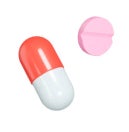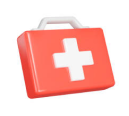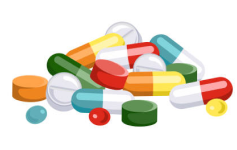Uses
What is Thioguanine (Tioguanine) for?
Thioguanine is an anticancer medication used in the treatment of leukemia. It works by interfering with the deoxyribonucleic acid (DNA) and ribonucleic acid (RNA) production.
How should I take or use Thioguanine (Tioguanine)?
- Thioguanine should be taken once daily in the evening, at the same time every day.
- Thioguanine is available in tablet form.
- To maximise absorption of Thioguanine, it should preferably be taken on empty stomach, i.e. either 1 hour before or 2 hours after food. However, if gastric discomfort is experienced whilst on Thioguanine, it may be taken with food. Please inform your pharmacist or doctor if you are doing so.
- If dose prescribed is less than one tablet (for e.g. half tablet or quarter tablet), use a tablet-cutter to cut the tablets in a still-air room. If your child is unable to swallow the tablet, soak the tablet in small volume of water and allow it to dissolve before administering the dose.
- Take precautions to avoid cytotoxic exposure: wear gloves and mask when handling the tablets. Please refer to “Safe Handling of Oral Cytotoxic Medications” for more details.
- Your doctor may change the dosage of Thioguanine depending on blood tests results. Always follow the doctor’s instructions strictly, and record the dose taken daily on the form given to you. Do not stop taking Thioguanine unless you are told to do so by your doctor. Do not take more or less than instructed.
What should I do if I forget to take or use Thioguanine (Tioguanine)?
- If you forget a dose, take it as soon as you remember. If it is nearer to the time of your next dose, skip the missed dose. Do not take two doses at the same time.
- Do not repeat dose if vomiting occurs after dose is administered, wait until the next scheduled dose. Contact the pharmacist or doctor if you repeatedly miss doses due to vomiting, even with the administration of anti-vomiting medicine.
Side Effects
What are some common side effects of Thioguanine (Tioguanine)?
Possible side effects from Thioguanine and their management are listed below. Always inform the doctor if you experience any side effects, so that the necessary monitoring may be conducted. Seek immediate medical attention if side effects are serious and urgent.
| SIDE EFFECTS | MANAGEMENT | |
|
Low white blood cell counts. White blood cells protect the body by fighting bacteria (germs) that cause infection. When the number of white blood cells is low, your child will be more susceptible to infections and may become very ill from these infections. |
To help prevent infection:
|
Seek medical help immediately if your child experiences any of the following:
|
|
Low platelet counts. Platelets are important for blood clotting. With low platelets, your child may bruise or bleed (for e.g. gums or nose) more easily than usual. |
Be safety conscious. Brush teeth gently with a soft-bristled toothbrush. |
|
|
Low red blood cell counts. Red blood cell transport oxygen to body cells. Your child may feel tired or lethargic if red blood cell is low. |
Ensure child gets ample rest. | |
|
Liver problems. Mild, transient changes to liver function may occur. |
Your doctor will monitor liver function using blood tests during therapy, and make adjustment to the therapy if necessary. In the rare event that yellowing of skin and/ or eye(s), dark coloured urine, pale coloured stools, or pain in the upper stomach occurs, seek medical help immediately. |
|
|
Nausea, vomiting, loss of appetite or diarrhea may rarely happen. |
Seek immediate medical help if severe or persistent vomiting or diarrhea occurs. | |
Handling
How should I store Thioguanine (Tioguanine)?
- Keep away from children
- Keep in a cool, dry place, away from direct sunlight
- Store at room temperature
For more information
What else should I know about Thioguanine (Tioguanine)?
- Do not take this medication if you are allergic to Thioguanine.
- Do not give your child any other medications, herbal products or vaccinations without consulting your doctor or pharmacist. Some medication or food may reduce its efficacy, or increase incidence of side effects where close monitoring is required. These include:
- Live vaccines, such as BCG, MMR and some forms of polio or influenza vaccines.
- Sulfasalazine, Mesalazine.
- Disclaimer: The list is not exhaustive. When in doubt, please consult the doctor or pharmacist.
Disclaimers
Please take note that the above is not a complete list of all possible side effects. If you have any concerns about your medication or if you have other side effects that you think are caused by this medication, please consult your doctor or pharmacist.
If you take more than the recommended dose, please seek medical advice immediately. The information provided on this page does not replace information from your healthcare professional. Please consult your healthcare professional for more information.
This article is jointly developed by members of the National Medication Information workgroup. The workgroup consists of cluster partners (National Healthcare Group, National University Health System and SingHealth), community pharmacies (Guardian, Unity and Watsons) and Pharmaceutical Society of Singapore. The content does not reflect drug availability and supply information in pharmacies and healthcare institutions. You are advised to check with the respective institutions for such information.
Contributed by
Last Updated on October 2017

Need More Medicine?
Use Medicine Order Service on HealthBuddy.

Medicines Reminder
Get reminders and chart progress on HealthBuddy.
Related Conditions or Treatments
Related Medicines or Drugs

















